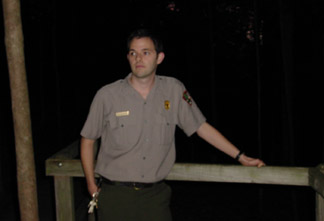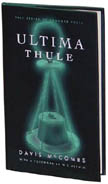Ultima
Davis McCombs... Poet... Ranger... Celebrity
By Steven Tweddell

Davis McCombs gets a lot of fan mail for a poet. Since his book of poems, Ultima Thule, came out in April, he now wears the badge of true celebrity, getting what he calls crazy letters.
"I had a woman send her picture," he says. "I've had them offer to buy me dinner, to meet me in New York."
There's no condescension when he offers an explanation, "I think poetry is really personal, and I think they read your book and they think they know you," he offers.
To hear him tell it, you'd think he's the luckiest guy around - lucky to have won the Yale Series of Younger Poets competition; lucky to have a Harvard education; lucky to have generated a mountain of publicity with his first book; and lucky to work at Mammoth Cave National Park as a park ranger.
And though he acknowledges it, he doesn't say as much about the role talent and hard work played.
In fact, he says if he had his way he'd never work again. He says that his mother asked him what he wanted to do when he was in college. "I'd like to never work and have a big garden," he told her.
"And that's not the answer that your mom wants to hear, especially when she's paying for you to go to Harvard," he admits. "But it's the truth."
It is and it isn't.
McCombs is actually happy to work - and if he didn't have a job, he'd be able to work more.
"I would be working," he explains. "I would write. Because that's what I want to do. Everything else is a distraction."
His job at Mammoth Cave and publicity and promotion for his book take up a lot of time he could be using to work on the next one.
And even though he might be happy to quit his day job, it has given him both a passion, and enough material for his first book.
He wrote a poem called "Dismantling the Cave Gate" in which he talks about the cave's "breath."
"Mammoth Cave on a hot summer day exhales a huge blast of 54 degree air," he says. "I had this idea of that breath of the cave being all pent up for [the] 50 years the gate was on there, and we tore it down and SSHHHHOOOO... out it came. And the bats were out here, flying around. It must have struck some kind of primal nerve."
McCombs is visibly in awe of the place, even after having worked there for nine years (he started working there in the summers during college). And it may be his love and wonder of the cave that give him his connection to Stephen Bishop - the slave who served as a guide from 1838 to 1857 and about whom McCombs writes.
He acknowledges that there will be people who will question his choice to write about a slave. After all, he is white and middle-class living a century and a half after Bishop's death. But he explains: "To think that I couldn't write about a slave or that a slave couldn't write about me or that a black person couldn't write about me posits this difference between people that I don't believe is true. I mean I think we're all human. Shakespeare can write about Othello if he wants to and Othello, if he existed, could write about Shakespeare."
And to hear McCombs talk about it, he didn't have a choice. "It was one spring in California," he says. "I have never written like that before and I may never write like that again. It was really intense, and they came so fast. It was just like opening a flood gate."
McCombs gets excited when he talks about this time in his life. "There is no happiness like that," he says. "I just got into this zone, and I just felt like I lived in this world of Mammoth Cave in the mid-1800s, and I would have to do certain things like go to the bank, or like cook dinner, or go to class occasionally, and I felt like I could not wait to get back there." He says he even stopped hanging out with his friends during this period and couldn't tell them why. They all thought he was angry or something. Nineteen poems later, they all understood.
This floodgate writing that he speaks so fondly about, however, doesn't happen very often. McCombs admits to being a very slow writer. "Most of my poems go through hundreds of drafts," he says. "They take weeks and months, and then occasionally there are poems that come quickly, and those are the ones that you have a special place in you heart for." Of those poems, he says, "you earn it by working really hard. I don't think the vast majority of people know how hard it is to write a poem. And the more I know about it, the more difficult it is."
To hear McCombs talk about the writing process, you wouldn't think he recently won one of the most coveted prizes among poets under 40. "You just go there and you confront the demons," he says. "It sucks. It's horrible. But you just have to do it to get the good stuff."
And many would agree that McCombs has confronted the demons, has gotten the good stuff, and he has a small pile of letters to show it.
Davis McCombs will read at 4 pm Thursday, September 28 at the University of Kentucky New Student Center, Room 230.
by Davis McCombs
(Yale Universiy Press )

Ultima Thule, Davis McCombs's new book of poems, reveals a deeply personal and complex relationship between poet and place reminiscent of Ireland's Poet Laureate Seamus Heaney. McCombs's penetrating exploration of both the history and physical landscape of Kentucky's famous Mammoth Cave National Park sheds light (sometimes shards and at other times beams) on a mysterious past and place.
The poems are broken into three sections, the first of which is written in the voice of Stephen Bishop, the slave who first explored the caves and led tours in the mid- 1800s.
By taking on this voice, McCombs, who was a tour guide himself, bridges the past and present, creating a continuity of voice and place that hauntingly stretches over time. He and Stephen Bishop have explored the same depths, and through very controlled language the poet renders the imagined experiences of his predecessor.
In the second and third sections, McCombs often employs the first person "I," and brings to life a place that he obviously holds sacred. Whether above ground or below, the words chosen and their combinations do more than simply describe a beautiful setting, they evoke a landscape the reader can see, feel and smell. For example, the poem "Kentucky" takes on a chant-like rhythm and offers clear, descriptive images such as "The fruit jar/ near the fieldstone/ wall... A road through/ cedars. Fencerows... Damp curtain, hot/night, blue moon..." Other poems in the second and third sections deal with McCombs's experiences in and around the park. Memory, wonder and appreciation radiate from these poems which possess a sincere and earthly quality that ties together poet and place.
Formally, the first and last series of poems make use of the fourteen line sonnet, but avoid strict adherence to metric patterns and rhymes, while the middle section is written in a looser free verse. Beautifully deep, mysterious and complex like the caves which have shaped this work, Ultima Thule is a unique work which a reader can return to over and over again, always finding something new to explore. -Daniel Elkinson